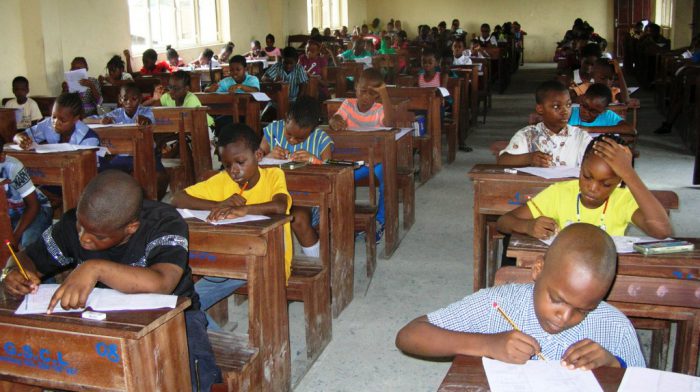In a groundbreaking reform, the Federal Government of Nigeria has announced the scrapping of the Junior Secondary School (JSS) and Senior Secondary School (SSS) systems, replacing them with a compulsory 12-year uninterrupted basic education model.

This move effectively eliminates the current 6-3-3-4 structure and introduces a new 12-4 education system.
The Minister of Education, Dr. Tunji Alausa, made the announcement in Abuja during the 2025 extraordinary National Council on Education (NCE) meeting.
The NCE, the highest policy-making body in Nigeria’s education sector, convened to deliberate on the nation’s educational policies and standards.
The meeting was attended by commissioners for education from the 36 states and the Federal Capital Territory (FCT), as well as representatives from agencies, parastatals, and development partners.
Key Features of the New Education Model
The new policy extends the duration of compulsory education in Nigeria, ensuring that students undergo uninterrupted schooling up to the age of 16 before progressing to higher education. Key aspects of the reform include:
- Abolition of JSS and SSS: Secondary education is now subsumed under the broader category of basic education.
- Standardized Curriculum: A uniform national curriculum will be implemented to ensure consistency in educational content across the country.
- Early Exposure to Vocational and Entrepreneurial Skills: The curriculum will integrate skill acquisition programs to prepare students for both higher education and employment.
- Reduction in Dropout Rates: By removing financial and systemic barriers, the reform aims to curb the high dropout rate among students.
- Alignment with Global Best Practices: The reform seeks to bring Nigeria’s education system in line with international standards, improving global competitiveness.
Minimum Age Requirement for Tertiary Education
As part of the reform, the Federal Government has proposed setting 16 years as the minimum age for entry into tertiary institutions.
According to Dr. Alausa, this policy is designed to ensure that students are emotionally and academically prepared for the challenges of higher education.
Expected Benefits of the Reform
Dr. Alausa emphasized that the 12-year basic education model would have significant economic and social impacts. “Extending basic education to 12 years will ensure a standardized curriculum that is uniformly implemented across the nation.
This will facilitate early exposure to vocational and entrepreneurial skills, preparing students for both higher education and employment,” he stated.
He further explained that students who receive an extended period of compulsory education would be better equipped with relevant skills, leading to a workforce that can contribute more meaningfully to national development.
Additionally, the policy is expected to reduce child labor and other social vices linked to premature school dropouts.
Implementation Strategies
To successfully integrate secondary education into basic education, the government has outlined several implementation strategies:
- Policy Reforms: Legislative and regulatory adjustments to accommodate the new education structure.
- Infrastructure Expansion: Investment in classroom construction, learning facilities, and digital education resources.
- Teacher Training and Recruitment: Hiring and training of educators to meet the demands of the expanded basic education system.
- Funding and Partnerships: increased budget allocation and collaboration with private sector stakeholders to ensure adequate financial resources.
- Curriculum Enhancement: Revision of the existing curriculum to incorporate vocational training, digital literacy, and entrepreneurship.
Challenges and Public Reaction
While the policy has been welcomed by many education stakeholders, concerns have been raised regarding its implementation. Critics point to existing infrastructural deficits, inadequate teacher training, and funding challenges as potential obstacles. Some parents and educators have also expressed concerns about how the transition will affect students currently in JSS and SSS levels.
Nonetheless, proponents argue that the reform is necessary to bridge the skill gap in Nigeria’s workforce and ensure that students acquire a well-rounded education before specializing at the tertiary level.
The abolition of the JSS and SSS system and the introduction of a 12-year compulsory basic education model mark a significant shift in Nigeria’s education sector.
While the policy aligns with international standards and promises to improve learning outcomes, its success will depend on effective implementation, adequate funding, and stakeholder collaboration. As the country embarks on this transformative journey, the coming years will reveal the true impact of this ambitious educational reform.

